最新上海市新世纪英语七年级(上)知识点大全
- 格式:doc
- 大小:60.00 KB
- 文档页数:18
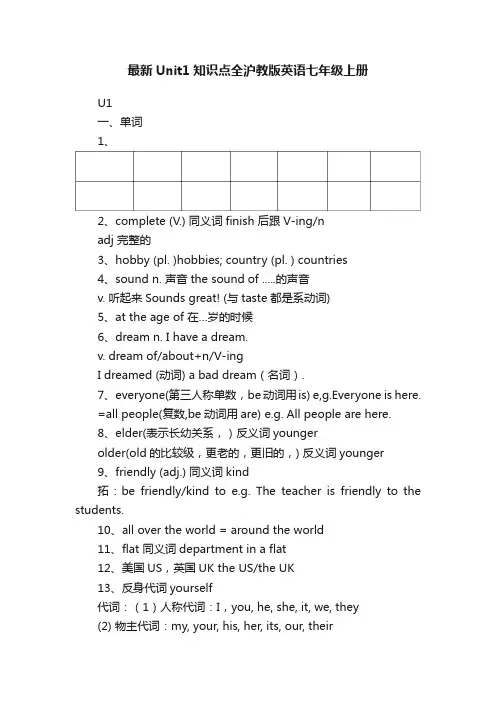
最新Unit1知识点全沪教版英语七年级上册U1一、单词1、2、complete (V.) 同义词finish 后跟V-ing/nadj 完整的3、hobby (pl. )hobbies; country (pl. ) countries4、sound n. 声音the sound of .....的声音v. 听起来Sounds great! (与taste都是系动词)5、at the age of 在…岁的时候6、dream n. I have a dream.v. dream of/about+n/V-ingI dreamed (动词) a bad dream(名词).7、everyone(第三人称单数,be动词用is) e,g.Everyone is here.=all people(复数,be动词用are) e.g. All people are here.8、elder(表示长幼关系,)反义词youngerolder(old的比较级,更老的,更旧的,) 反义词younger9、friendly (adj.) 同义词kind拓:be friendly/kind to e.g. The teacher is friendly to the students.10、all over the world = around the world11、flat 同义词department in a flat12、美国US,英国UK the US/the UK13、反身代词yourself代词:(1)人称代词:I,you, he, she, it, we, they(2) 物主代词:my, your, his, her, its, our, theirmine, yours, his , hers, its, ours, theirs (2)指示代词:this,that,these,those(3)反身代词:yourself14、close to 同义词near;反义词far away from15、go to school 去上学(表功能)go to the school 去学校(表地点)有the 表地点,无the表功能同类用法:go to the bed , go to bed16、be good at(后接V-ing)=do well in (后接V-ing)e.g. I am good at playing footballI do well in playing football二、语法1、特殊疑问词(7W+1H)(1)对“谁”提问用who(2)对“事件”、“物体”、“职业”提问用what(3)对“时间”提问用when/what time(4)对“地点”提问用where(5)对“谁的”提问用whose(6)对“原因”提问用why(7)对“哪一个”提问用which(8)对“交通方式”、“问好”提问用how相关短语提问:班级:what class 颜色what color 几点what time星期what day 日期what’s the date年龄:how old 多少how many/how much 价格:how much 多高how tall 多重how heavy 多久how long 多远how far2、冠词(1)定冠词the (2)不定冠词a/ana + 辅音音素开头的单词an+元音音素开头的单词元音音素开头的单词有:apple, orange, egg, eraser, elephant,old schoolbag, e-friend, actor, engineer, English, elder brother, art, hour, umbrella 26个英文字母前用an的有:a,e,i,o,f,h,l,m,n,r,s,xeg. There is “s” in the word of “else”.三、课文部分1、welcome to +地点2、Anna's(名词所有格形式)名词所有格的变化规则:(1)通常在词尾+’s;(2)以s结尾的+’(3)表示共有时,只在最后一个名词的词尾加’s,(4) 各自所有时,则分别在每个名词词尾加’s.3、come from=be from 来自4、live in 居住在;live with 与.....一起生活5、close to=near (介词短语做house的定语)反义词:far away from6、a/an复习7、by school bus=take the school busby bus =take a/the bus8、favorite =like…best9、subject 复数subjects10、to be 成为11、many+可数名词复数;much修饰不可数名词;lots of 即可修饰可数名词复数,又可修饰不可数名词12、be good at doing sth.=do well in doing sth.13、would like to do sth =want to do sth14、make friends with 交朋友15、all over=around 16. young people 年轻人四、其他短语P4 in one’s free time 在某人空闲的时间answer to 回答P5 like to do /like doing 喜欢做。
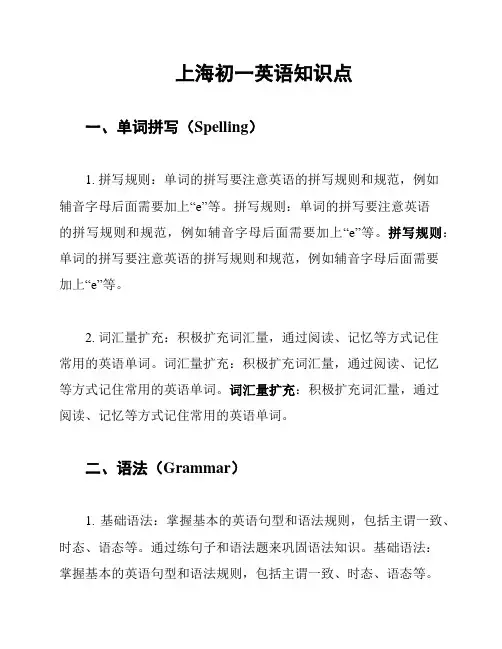
上海初一英语知识点一、单词拼写(Spelling)1. 拼写规则:单词的拼写要注意英语的拼写规则和规范,例如辅音字母后面需要加上“e”等。
拼写规则:单词的拼写要注意英语的拼写规则和规范,例如辅音字母后面需要加上“e”等。
拼写规则:单词的拼写要注意英语的拼写规则和规范,例如辅音字母后面需要加上“e”等。
2. 词汇量扩充:积极扩充词汇量,通过阅读、记忆等方式记住常用的英语单词。
词汇量扩充:积极扩充词汇量,通过阅读、记忆等方式记住常用的英语单词。
词汇量扩充:积极扩充词汇量,通过阅读、记忆等方式记住常用的英语单词。
二、语法(Grammar)1. 基础语法:掌握基本的英语句型和语法规则,包括主谓一致、时态、语态等。
通过练句子和语法题来巩固语法知识。
基础语法:掌握基本的英语句型和语法规则,包括主谓一致、时态、语态等。
通过练句子和语法题来巩固语法知识。
基础语法:掌握基本的英语句型和语法规则,包括主谓一致、时态、语态等。
通过练习句子和语法题来巩固语法知识。
2. 动词用法:熟练掌握动词的时态、语态、非谓语动词等用法。
特别注意一些常见动词的不规则变化。
动词用法:熟练掌握动词的时态、语态、非谓语动词等用法。
特别注意一些常见动词的不规则变化。
动词用法:熟练掌握动词的时态、语态、非谓语动词等用法。
特别注意一些常见动词的不规则变化。
3. 名词变化:了解名词的单复数、所有格等形式变化规则,注意不规则名词的变化。
名词变化:了解名词的单复数、所有格等形式变化规则,注意不规则名词的变化。
名词变化:了解名词的单复数、所有格等形式变化规则,注意不规则名词的变化。
4. 形容词和副词比较级和最高级:研究形容词和副词的比较级和最高级的构成规则,注意特殊形容词和副词的变化。
形容词和副词比较级和最高级:研究形容词和副词的比较级和最高级的构成规则,注意特殊形容词和副词的变化。
形容词和副词比较级和最高级:学习形容词和副词的比较级和最高级的构成规则,注意特殊形容词和副词的变化。
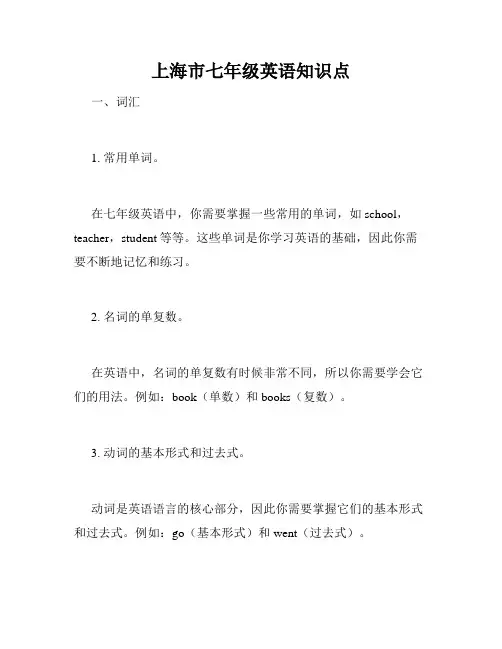
上海市七年级英语知识点一、词汇1. 常用单词。
在七年级英语中,你需要掌握一些常用的单词,如school,teacher,student等等。
这些单词是你学习英语的基础,因此你需要不断地记忆和练习。
2. 名词的单复数。
在英语中,名词的单复数有时候非常不同,所以你需要学会它们的用法。
例如:book(单数)和books(复数)。
3. 动词的基本形式和过去式。
动词是英语语言的核心部分,因此你需要掌握它们的基本形式和过去式。
例如:go(基本形式)和went(过去式)。
4. 介词和连词。
介词和连词是英语语言中非常重要的一部分,因为它们可以连接单词、短语和句子。
其中一些常用的介词和连词包括in,on,and和but。
二、语法1. 一般现在时。
在英语中,一般现在时表示现在的情况和状态。
例如:I eat breakfast at 7 o'clock every morning。
2. 一般过去时。
一般过去时表示现在和过去之间的情况和状态。
例如:I went to the park yesterday。
3. 现在进行时。
现在进行时表示现在正在发生的行动或事件。
例如:I am studying English now。
4. 代词和名词性物主代词。
代词和名词性物主代词是常用的语法题目。
例如:I have a book. It is mine。
5. 形容词和副词。
形容词和副词在英语中是非常重要的一部分,因为它们可以修饰名词和动词。
例如:He is a good boy. He runs fast。
三、阅读理解阅读理解是英语考试中非常重要的部分。
在阅读理解中,你需要仔细阅读文章,理解文章中的主题和内容,并在文中找到正确的答案。
四、听力听力是英语考试中的另一个重要部分。
你需要仔细听并理解对话或短文的内容,然后回答相关的问题。
总结在学习七年级英语的过程中,你需要掌握一些基本的语法和词汇,并且不断练习阅读和听力技能。
只有这样,你才能在英语考试中取得好成绩。
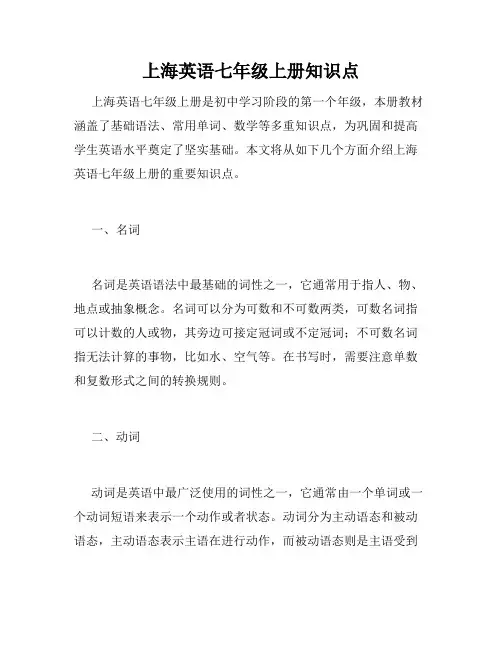
上海英语七年级上册知识点上海英语七年级上册是初中学习阶段的第一个年级,本册教材涵盖了基础语法、常用单词、数学等多重知识点,为巩固和提高学生英语水平奠定了坚实基础。
本文将从如下几个方面介绍上海英语七年级上册的重要知识点。
一、名词名词是英语语法中最基础的词性之一,它通常用于指人、物、地点或抽象概念。
名词可以分为可数和不可数两类,可数名词指可以计数的人或物,其旁边可接定冠词或不定冠词;不可数名词指无法计算的事物,比如水、空气等。
在书写时,需要注意单数和复数形式之间的转换规则。
二、动词动词是英语中最广泛使用的词性之一,它通常由一个单词或一个动词短语来表示一个动作或者状态。
动词分为主动语态和被动语态,主动语态表示主语在进行动作,而被动语态则是主语受到某种动作的影响。
在使用时,需要避免使用被动语态过于频繁,避免文章晦涩难懂。
三、词汇词汇是语言中非常重要的一部分,学习者需要熟练掌握大量的单词才能准确表达自己的意思。
建议学生可以通过阅读英语原版小说、杂志或者看英语电影来扩大词汇量。
四、语法语法是英语中最复杂的方面之一,学生需要理解不同的时态、语态、语法关系、语法结构等概念。
在学习过程中,需要注重做好语法练习,努力加深对语法知识的理解和掌握。
五、阅读阅读是培养英语技能的最基础的方法之一,它可以提升学生的写作、听力和口语能力。
在阅读过程中,需要注重理解文章意思、短语搭配、语法结构等,逐步提升对英语的理解和运用能力。
六、写作写作是英语学习的重要方面之一,它可以提升学生的写作技巧,提高表达能力。
在写作过程中,需要遵循语法规则、正确地使用单词和短语,注重语言的连贯性,以便让读者更好地理解你所表达的意思。
总之,上海英语七年级上册的知识点包括词汇、语法、阅读、写作等多个方面,需要学生们注重练习和理解,在学习过程中不断提升自己的运用能力。
相信通过不断的努力和练习,学生可以在英语学习方面取得不俗的成绩。
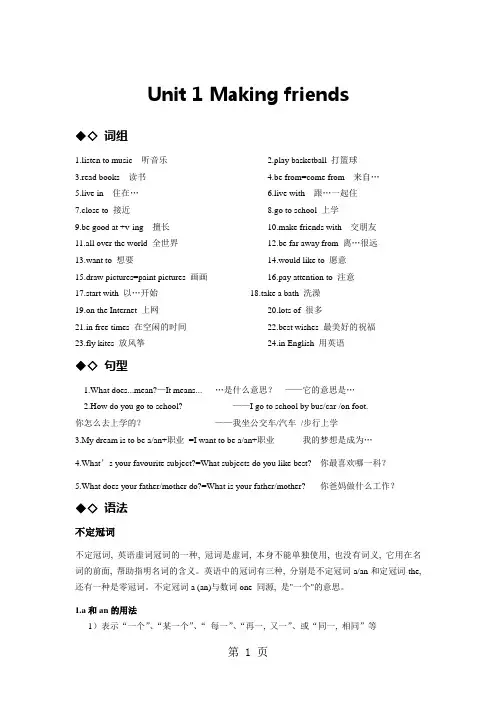
Unit 1 Making friends◆◇ 词组1.listen to music 听音乐2.play basketball 打篮球3.read books 读书4.be from=come from 来自…5.live in 住在…6.live with 跟…一起住7.close to 接近8.go to school 上学9.be good at +v-ing 擅长10.make friends with 交朋友11.all over the world 全世界12.be far away from 离…很远13.want to 想要14.would like to 愿意15.draw pictures=paint pictures 画画16.pay attention to 注意17.start with 以…开始18.take a bath 洗澡19.on the Internet 上网20.lots of 很多21.in free times 在空闲的时间22.best wishes 最美好的祝福23.fly kites 放风筝24.in English 用英语◆◇句型1.What does...mean?—It means... …是什么意思?——它的意思是…2.How do you go to school? ——I go to school by bus/car /on foot.你怎么去上学的?——我坐公交车/汽车/步行上学3.My dream is to be a/an+职业=I want to be a/an+职业我的梦想是成为…4.What’s your favourite subject?=What subjects do you like best? 你最喜欢哪一科?5.What does your father/mother do?=What is your father/mother? 你爸妈做什么工作?◆◇语法不定冠词不定冠词, 英语虚词冠词的一种, 冠词是虚词, 本身不能单独使用, 也没有词义, 它用在名词的前面, 帮助指明名词的含义。
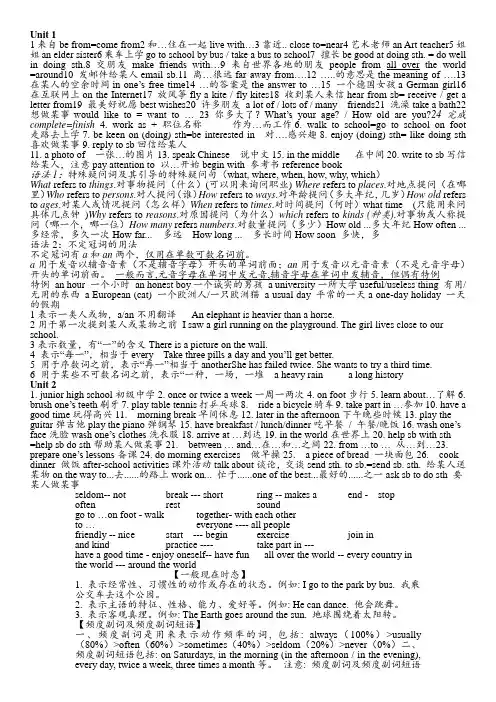
Unit 11来自be from=come from2和...住在一起live with...3靠近.. close to=near4艺术老师an Art teacher5姐姐an elder sister6乘车上学go to school by bus / take a bus to school7 擅长be good at doing sth. = do well in doing sth.8交朋友make friends with...9来自世界各地的朋友people from all over the world =around10 发邮件给某人email sb.11 离...很远far away from....12 .....的意思是the meaning of . (13)在某人的空余时间in one’s free time14 …的答案是the answer to …15 一个德国女孩a German girl16 在互联网上on the Internet17 放风筝fly a kite / fly kites18 收到某人来信hear from sb= receive / get a letter from19 最美好祝愿best wishes20 许多朋友a lot of / lots of / many friends21 洗澡take a bath22 想做某事would like to = want to … 23 你多大了?What’s your age?/ How old are you?24 完成complete=finish4. work as + 职位名称作为…而工作6. walk to school=go to school on foot 走路去上学7. be keen on (doing) sth=be interested in 对….感兴趣8. enjoy (doing) sth= like doing sth 喜欢做某事9. reply to sb回信给某人11. a photo of 一张…的图片13. speak Chinese 说中文15. in the middle 在中间20. write to sb写信给某人,注意pay attention to 以…开始begin with 参考书reference book语法1:特殊疑问词及其引导的特殊疑问句(what, where, when, how, why, which)What refers to things.对事物提问(什么)(可以用来询问职业) Where refers to places.对地点提问(在哪里)Who refers to persons.对人提问(谁)How refers to ways.对年龄提问(多大年纪,几岁)How old refers to ages.对某人或情况提问(怎么样)When refers to times.对时间提问(何时)what time (只能用来问具体几点钟)Why refers to reasons.对原因提问(为什么)which refers to kinds (种类).对事物或人称提问(哪一个,哪一位)How many refers numbers.对数量提问(多少)How old ...多大年纪How often ... 多经常,多久一次How far... 多远How long ... 多长时间How soon 多快,多语法2:不定冠词的用法不定冠词有a和an两个,仅用在单数可数名词前。
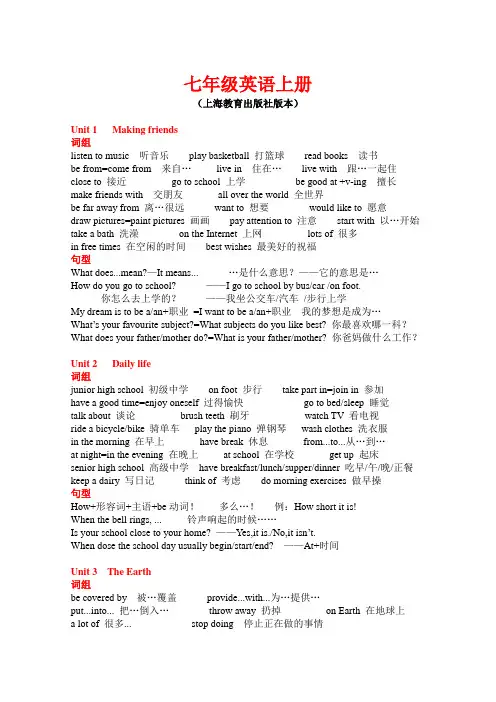
七年级英语上册(上海教育出版社版本)Unit 1 Making friends词组listen to music 听音乐play basketball 打篮球read books 读书be from=come from 来自…live in 住在…live with 跟…一起住close to 接近go to school 上学be good at +v-ing 擅长make friends with 交朋友all over the world 全世界be far away from 离…很远want to 想要would like to 愿意draw pictures=paint pictures 画画pay attention to 注意start with 以…开始take a bath 洗澡on the Internet 上网lots of 很多in free times 在空闲的时间best wishes 最美好的祝福句型What does...mean?—It means... …是什么意思?——它的意思是…How do you go to school? ——I go to school by bus/car /on foot.你怎么去上学的?——我坐公交车/汽车/步行上学My dream is to be a/an+职业=I want to be a/an+职业我的梦想是成为…What’s your favourite subject?=What subjects do you like best? 你最喜欢哪一科?What does your father/mother do?=What is your father/mother? 你爸妈做什么工作?Unit 2 Daily life词组junior high school 初级中学on foot 步行take part in=join in 参加have a good time=enjoy oneself 过得愉快go to bed/sleep 睡觉talk about 谈论brush teeth 刷牙watch TV 看电视ride a bicycle/bike 骑单车play the piano 弹钢琴wash clothes 洗衣服in the morning 在早上have break 休息from...to...从…到…at night=in the evening 在晚上at school 在学校get up 起床senior high school 高级中学have breakfast/lunch/supper/dinner 吃早/午/晚/正餐keep a dairy 写日记think of 考虑do morning exercises 做早操句型How+形容词+主语+be动词!多么…!例:How short it is!When the bell rings, ... 铃声响起的时候……Is your school close to your home? ——Yes,it is./No,it isn’t.When dose the school day usually begin/start/end? ——At+时间Unit 3 The Earth词组be covered by 被…覆盖provide...with...为…提供…put...into... 把…倒入…throw away 扔掉on Earth 在地球上a lot of 很多... stop doing 停止正在做的事情stop to do 停止(手上做的接着去)做某事save water 节约用水in the future 将来in the air 在空中lift up 升高句型There is+单数可数名词/不可数名词有……There are+可数名词复数有……It is + adj + (for sb) to do sth (对某人来说)做某事很…Unit 4 Seasons词组take a trip 去旅行make snowmen/a snowman 堆雪人go on /have a picnic 野餐fly kites 放风筝go swimming 去游泳in + 季节/月份(spring/summer/March/July)at the time of 在…的这个时候send out 发出have a lot of fun 玩得很开心get + adj.(warm/hot/cold) 逐渐变…start to = begin to 开始…句型It is interesting/exciting to do sth. 做某事很有趣/兴奋It spends some time dong/to do sth. 做某事花费某时间—What’s the weather like in + 某地+ today? 某地今天天气如何?—It’s hot, but it will be rainy a few days later. 很热,不过过几天会下雨。
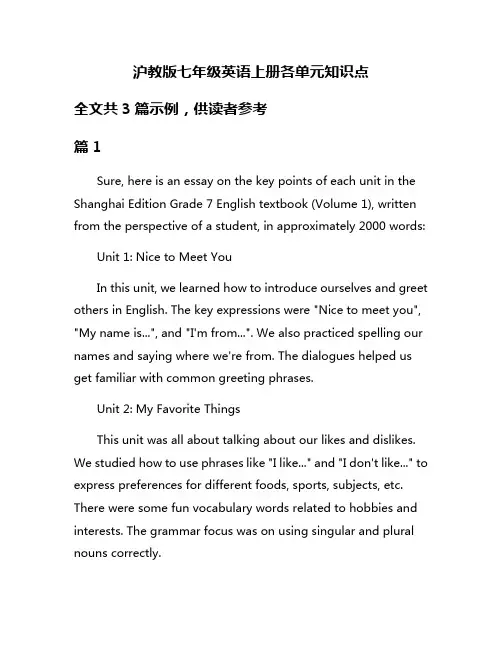
沪教版七年级英语上册各单元知识点全文共3篇示例,供读者参考篇1Sure, here is an essay on the key points of each unit in the Shanghai Edition Grade 7 English textbook (Volume 1), written from the perspective of a student, in approximately 2000 words:Unit 1: Nice to Meet YouIn this unit, we learned how to introduce ourselves and greet others in English. The key expressions were "Nice to meet you", "My name is...", and "I'm from...". We also practiced spelling our names and saying where we're from. The dialogues helped us get familiar with common greeting phrases.Unit 2: My Favorite ThingsThis unit was all about talking about our likes and dislikes. We studied how to use phrases like "I like..." and "I don't like..." to express preferences for different foods, sports, subjects, etc. There were some fun vocabulary words related to hobbies and interests. The grammar focus was on using singular and plural nouns correctly.Here we learned to describe our daily routines and schedules. The time expressions (e.g. in the morning, at night) and sequence words (first, then, after that) were really useful. We practiced asking "What time do you...?" and answering with sample schedules. Understanding adverbs of frequency was key for this unit.Unit 4: Looking GoodAppearance and clothing were the themes of this unit. By learning adjectives to describe how people look (tall, short, etc.) and words for different items of clothing, we could say things like "He's wearing a red shirt". We also learned how to use possessive adjectives correctly. The readings gave some interesting cultural perspectives on fashion.Unit 5: Activities and InterestsThis unit combined some of the language from previous units to allow us to talk more fully about our hobbies, free-time activities, and personal interests. The key grammar points included using the simple present tense for habits/routines and giving reasons with "because". We read about different extracurricular activities students can join.The dialogues and texts in this unit were all about celebrating special occasions and events like birthdays, holidays, etc. We studied vocabulary related to celebrations as well as phrases for giving good wishes ("Have a great day!", "Congratulations!"). Using prepositional phrases to indicate dates and times was practiced.Unit 7: Animal WorldAs you can guess, this unit introduced different animals and their characteristics. We learned words for describing animals' physical features, behaviors, habitats, etc. The grammar focused on proper use of demonstrative pronouns (this, that, these, those) as well as making comparisons using "as...as". The reading gave some insights into animal intelligence.Unit 8: Going PlacesThis unit equipped us with language for talking about travel, transportation, sights to see, and tourist activities. We studied different modes of transport and phrases you need when taking a trip ("check in", "book a hotel", etc.). The use of prepositions for indicating locations was highlighted. Reading a travel brochure was one of the tasks.Overall, this textbook has provided a solid foundation in conversational English centering on practical, real-life topics that middle school students can relate to. While building our vocabulary and grammatical knowledge, we've also gained insights into different cultures and perspectives through the readings. I feel much more confident using English to communicate about my daily experiences, interests, and future plans.篇2Unit 1: Hello, New TermIn this unit, we learned how to greet people and introduce ourselves in different situations. The key grammar points covered pronoun cases (I, me, you, etc.), the verb "to be" in different tenses, and question words like "what", "who", and "where". We also studied vocabulary related to school subjects, personal interests, and hobbies.Unit 2: The Same or DifferentThis unit focused on making comparisons using comparative and superlative adjectives. We learned how to form the comparative and superlative forms of one-syllable andmulti-syllable adjectives. The grammar section also includedusing "as...as" to show equality. New vocabulary revolved around describing people's personalities, appearances, and abilities.Unit 3: A Piece of AdviceHere, we explored the use of modal verbs like "should", "must", "have to" to give advice or make suggestions. The grammar covered forming negative and interrogative sentences with modals too. We read some interesting texts that gave advice on things like managing stress and dealing with peer pressure. New words were related to mental health, peer relationships, and social issues.Unit 4: A Brighter FutureIn this unit, we learned about expressing future plans and intentions using "will", "going to", and present continuous tense. The grammar section highlighted the different usages of these future forms. We studied vocabulary related to environmental protection, natural resources, and sustainability. The reading texts discussed ways to create a more eco-friendly future.Unit 5: In Memory of the PastThis unit introduced us to narrating past events using simple past tense. We covered the rules for regular and irregular verbs, as well as forming negative and interrogative sentences in simplepast. New vocabulary revolved around describing life experiences, family history, and cultural traditions. The texts gave insights into different cultures and customs.Unit 6: Telling StoriesHere we explored story telling techniques using past continuous tense and the contrast between past simple and past continuous. Grammar focused on forming the past continuous and using it to set the scene or describe ongoing actions. Vocabulary was related to narrating stories, describing scenes, using adverbs, and adding details.Unit 7: Living and TravelingIn this unit, we learned how to make comparisons using "as...as", "not as...as", "the same as", and other structures. The grammar also covered using quantifiers like "a few", "a little", "many", "much" etc. We expanded our travel vocabulary and read texts about different holiday destinations.Unit 8: Media and CommunicationsThis unit was all about talking about abilities using"can/can't", "could/couldn't" for past abilities, and modal verbs like "may/might" to express possibility. We studied vocabulary related to media, technology, and communication methods.Texts discussed the influence of media and social skills for the digital age.Throughout the textbook, we also learned lots of useful phrases and expressions to make our English sound more natural and fluent. Overall, this textbook helped improve our reading, writing, listening, and speaking abilities while introducing key grammar concepts.篇3Sure, here's an article about the key points covered in each unit of the Shanghai Education Edition Grade 7 English textbook (Volume 1), written from a student's perspective. The article is approximately 2,000 words long and is written in English.Title: Navigating the Shanghai Education Edition Grade 7 English Textbook (Volume 1)As a seventh-grader, the Shanghai Education Edition English textbook has been our trusty companion in our journey to mastering the English language. Each unit presents a unique set of challenges and opportunities for growth, and I'm excited to share my insights into the key points covered in Volume 1.Unit 1: Hello, New Term!Diving into the first unit, we were introduced to the basics of greetings, introductions, and expressing likes and dislikes. We learned how to engage in simple conversations, asking and answering questions about our hobbies, favorite subjects, and aspirations. The unit also touched upon the importance of punctuality and being on time, a valuable lesson for our daily lives.Unit 2: My FamilyThis unit was all about family dynamics and relationships. We explored different family members' roles and responsibilities, as well as how to describe their appearances and personalities. Additionally, we learned how to express our feelings towards our family members and the importance of cherishing these bonds.Unit 3: My DayAh, the unit that taught us how to talk about our daily routines! We learned to use time expressions and sequence words to describe our activities from morning till night. From brushing our teeth to doing homework, we can now articulate our schedules with ease. The unit also introduced us to the concept of making plans and appointments, a handy skill for the future.Unit 4: My HobbyHobbies are such a fun topic, and this unit allowed us to explore different activities and interests. We learned how to express our likes and dislikes, as well as how to invite others to join in our hobbies. The unit also touched upon the importance of having a balanced lifestyle and managing our time effectively.Unit 5: My School LifeSchool life is a significant part of our lives, and this unit helped us understand how to talk about it in English. We learned how to describe our classrooms, subjects, teachers, and extracurricular activities. The unit also covered the concept of school rules and the importance of discipline in academic settings.Unit 6: My NeighborhoodExploring our neighborhoods was the focus of this unit. We learned how to describe different types of buildings, shops, and public facilities. The unit also introduced us to the concept of giving directions, a valuable skill for navigating unfamiliar areas.Unit 7: My WeekendWeekends are a time for relaxation and fun, and this unit taught us how to express our weekend plans and activities. Welearned how to discuss different forms of entertainment, such as watching movies, going to the park, or visiting friends. The unit also covered the importance of balancing work and leisure.Unit 8: My VacationAh, the unit that made us all dream of summer vacations! We learned how to talk about different vacation destinations, modes of transportation, and travel preparations. The unit also introduced us to the concept of describing experiences and sharing stories from our trips.As we progressed through Volume 1 of the Shanghai Education Edition Grade 7 English textbook, we not only expanded our vocabulary and improved our grammar, but we also gained valuable insights into different aspects of life. From family dynamics to school routines and neighborhood explorations, each unit provided us with a unique perspective and prepared us for real-world conversations and experiences.。

新版上海牛津版七年级上册unit7知识点the Club Fair【添砖加瓦】fair 是可数名词 ,意为“”.We held the World Fair in Shanghai.我们在上海举办了世界博览会.fair 还可作形容词 ,意为“公平的 ,公正的” .The teacher is fair.Photography Club【添砖加瓦】其中 photography 是不可数名词 ,意为“”;photograph 是可数名词 ,意为“” .Tom likes photography.Solar Power Club【添砖加瓦】power 是不可数名词 ,意为“能,能量”.I did everything in my power to help him. 我尽全力帮助他 .Last month, they attended the Clubs Fair.【添砖加瓦】last 最“近的 ,上一个的” Where did you go last week?“最后一个的”意思 .She was the last to arrive.attend 是及物动词 ,意为“出席 ,参加”,指出席会议或重要场合 .出席会议 ________________ 上课 ________________ 出席婚礼 ________________辨析: attend; join ;join in; take part inAttend: 意为“出席 ,参加(会议 ,讲座 ,婚礼 ,报告等)”I didn’ t attend the meeting.Join: 意为“加入某个组织”,强调成为某个团体中的一员join a club 参加社团 , join the army 参军 ,Will you join us for dinner? 请你和我们一起吃饭好吗?Join in: 意为“参加某项活动”(小型活动) ,尤其指和其他人一起参加某项活动May I join in the game?我可以参加这个比赛吗?Take part in:指参加群众性活动、会议、劳动、游行等(大型活动),往往指参加者持有积极的态度 ,起一份作用 ,有时与 join in 可互换 .Will you take part in the English evening?同我们一起参加英语晚会好吗?【牛刀小试】用attend;join ;join in; take part in的正确形式填空 .1.He will never forget the day when he __________the Party.2.His brother __________ the army three years ago.3.__________ the ball game.4.Why didn ’ t you __________ the talk lastight?n5. A great number of students __________ May 4 Movement.6.Do U want to __________ my birthday party?7.He didn ’ t __________ the meeting last night.8.I will __________ an important weeding tomorrow.Our club will teach you how to build rockets.【有章有法】teach sb. sth. 教某人某物 /某事sb.是间接宾语sth.是直接宾语how to do sth.是“疑 +不定式”作的用法 .【牛刀小】Can you tell me(如何制作筝)? Please show me(如何画一匹).我不知道去哪儿 .________________________________她不知道下一步做什么.________________________________Then “然后 ,其次”Then you can launch them into the sky.【添加瓦】作副 ,可表示“那么”;作名 ,意“那(常作介)”Then why did you do it?by then 到那from then on 从那以后till then 到那止Disappear 不及物 ,意“”,反是, “出”.Surprised ;surprising ;surprise【火眼金睛】surprised 形容 ,意“ ⋯⋯感到惊奇”,句子的主通常是人 ;surprising 形容 ,意“令人惊奇的”,主通常是物;surprise 名 ,意“惊奇”.be surprised at⋯⋯ 感到惊奇give sb. a surprise某人一个惊喜to one ’ s surprise令某人吃惊的是【牛刀小】He is very __________ to see Jay on the street.The news is very __________.To my __________ , he was a thief.The result is __________ .I was __________ to see him there.Will it go all the way into space?【添加瓦】into 介 ,意“到⋯⋯里面去”all the way 意“一路上 ,自始至”another 形容 ,意“再一的 ,另一的 ,的”【火眼金睛】another:表示不确定数目中的“另一个”.That ’ s quite another matter那完.全是另一回事 .the other:表示两个人或两事物中的“另一个”.Both my uncles are abroad: one is in Paris and the other is in New York.【牛刀小】He has two daughters. One is a nurse, _________ is a worker.I don’t like this one. Please show me _________.This glass is broken. Get me _________ .I have two markers. One is red, _________is green.shout,意“喊叫”【添加瓦】shout to 是由于距离 ,声音小而“高声喊叫”; I shout to her to help me.shout at 表示生气某人大喊大叫,度不友好 .Don ’ t shout at thatold man. take ⋯ from 意“从⋯⋯中取出⋯⋯”Judy took a pen from her pencil case.Few; a few; little; a little【火眼金睛】a few 意“几个 ,少数(有几个 ,肯定意)”,用来修可数名复数.few 意“几个 ,少数(几乎没有 ,否定意)”,用来修可数名复数.区: little, a little + 不可数名(有 a 有 ,无 a 无)There are a few boys playing on the playground.There are few boys playing on the playground.【牛刀小】1.There is _______ water in the glass. Let's go and get some.A. fewB. a fewC. a littleD. little2. We still have _______ apples in the basket. Youdon’t have to buy any.A. fewB. a fewC. littleD. a little3. I am new here. So I have _______friends here.A. fewB. a fewC. littleD. a little4. The twins can speak only _______ French.A. fewB. a fewC. littleD. a little5.Let's go and have a drink. We still have _______time before the train leaves.A. fewB. a fewC. littleD. a littleThat ’ s wonderful.【添加瓦】wonderful 形容 ,意“神气的 ,妙的 ,极好的”I ’ m sure you ’ ll have a wonderful time.It ’ s wonderful to go swimming in summer.match 可数名 ,意“比 ,”.【添加瓦】行比 ________________ 看比 ________________ 在比中 ________________下周我要行一球.________________________________________________ on TV 意“在上”.但是“在广播里”“在上”What did you do next?【添加瓦】next 副 ,意“其 ,然后”,可置于句首、句中或句末.When shall we meet next? next 可作形容 ,意“下一个的 ,接下来的”“隔壁的 ,(空上)最近的”next door 家;隔壁 ,next room 隔壁房next 名 ,意“下一个” the year after next后年Next, please!next 介 ,意“在⋯⋯旁” a seat next her fire 炉子旁的座位It was boring.【添加瓦】boring 一般修物 , 意“令人倦的 ,乏味的”bored 通常修人 ,意“感到无聊的”.The boy feels very _______.The book is very _______.I was so excited that I could not sleep.【添加瓦】so⋯⋯ that意“如此⋯⋯以至于”,The little girl is so lovely that everyone loves her.我弟弟如此小以至于无法照自己.________________________________________________个女孩如此小以至于无法搬个箱子.________________________________________________hurry 不及物 ,意“赶 ,匆忙”He hurried to get to school after breakfast.hurry 名 ,意“急忙 ,促” in a hurryShe ran to school in a hurry.useful 形容 ,意“有用的 ,有益的 ,有帮助的”,常在句中作表或定 .【添加瓦】This is a useful book for English beginners.以-ful 尾的形容的反多是相的以-less尾的形容useful— useless helpful —helpless careful— careless重要句型1. Teach sb how to do sth教某人如何做某事2. 主 +be+So+adj +that主 ++So+ adv+that如此......以至于......3. Finally,it was time to go home.it is\was time to do sth 是做某事的了二、堂根据提示 ,完成句子 .1.爱丽丝教我们如何制作蛋糕.Alice__________ us__________ __________ __________ cakes.2.我起床如此的迟以至于我上学迟到了.I get up__________ __________ __________ I am late for school.3.汤姆 ,该吃早饭了 .Tom,it is__________ _________ __________ __________.II.根据句意及首字母提示写单词 ,补全句子 .6.Mary doesn't like the pair of shoes, so I show her a ____________ pair.7.If I am not busy today, I will a ____________ the meeting this afternoon.8.We try to use the wind p ____________ in this area.9.The small rabbit ran so fast, and it d ____________ soon.10.---- Look! These pictures are so a ____________!----Yes,I agree with you.III.从方框中选择适当的短语并用其正确形式填空 ,补全句子 .learn about;all the way;of course;remote; control; solar power;play with;thanks for;all around;give ... back to; a few minutes later---- Sorry, I have to finish my homework first.12.____________ your help. And I can finish my work on time.13.We should ____________ how to deal with relationships in our daily life.14.When we are watching TV, we always use a (n) ____________.15.____________ , our babysitter 护(婴员 ) came in and I went out.16.If you don't like the book, you can tell us to ____________ the money ____________ you.17.There are a lot of people talking ____________ him tonight.18.We always hope the prices can fall ____________.19.---- Lily, shall we go for a walk after supper?--- ____________. Let's go!20. This machine can work by ____________.单选题:() 21. ---- What did you do yesterday, Ben?---- Well, I __________ a meeting and then had dinner with my friends.A. joinedB. attendedC. took partD. joined in() 22. John, __________ and answer the question, please.A. standing upB. stand upC. stands upD. stood up.() 23. A lot of people get a cold because of the __________ bad weather.A. recentB. nextC. nearD. closed() 24. Little John __________ in his new school last year.A. have a good timeB. has a wonderful timeC. enjoyedD. enjoyed himself() 25. It is dangerous for a child to use a knife __________ something.A. cutB. cuttingC. to cutD. cuts() 26. ---- I would like a cup of green tea.---- __________.A. I tooB. Too IC. Too meD. Me too() 27. __________ the London Olympic Games __________ on July 27th, 2012?A. Did; beganB. Does; beginC. Did; beginD. Will; begin( ) 28. It is Sunday today, so I will teach my little sister __________ to draw pictures.A. whyB. whenC. whatD. how( ) 29. ---- Mike, I was so __________ that I can't believe my eyes.---- I agree with you. It is so __________.A. surprise; surprisedB. surprised; surprisedC. surprising; surprisedD. surprised; surprising( ) 30. ---- Mum, it is time __________ a story. I am going to bed.---- OK. Let's start.A. tellB. tellsC. to tellD. told。
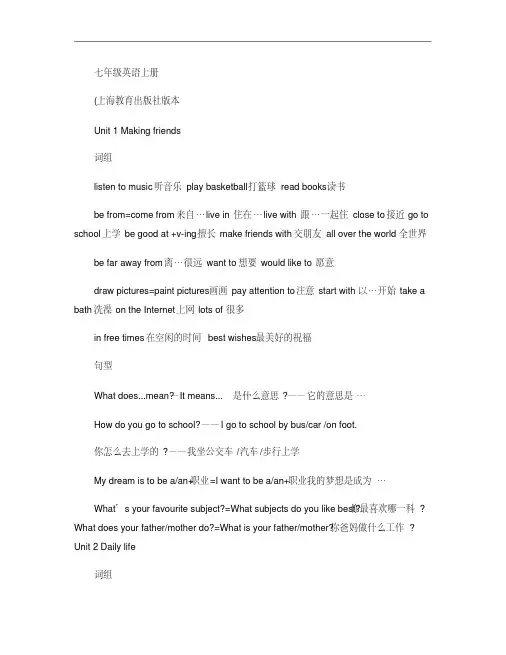
七年级英语上册(上海教育出版社版本Unit 1 Making friends词组listen to music 听音乐play basketball 打篮球read books 读书be from=come from 来自…live in 住在…live with 跟…一起住close to 接近go to school 上学be good at +v-ing 擅长make friends with 交朋友all over the world 全世界be far away from 离…很远want to 想要would like to 愿意draw pictures=paint pictures 画画pay attention to 注意start with 以…开始take a bath 洗澡on the Internet 上网lots of 很多in free times 在空闲的时间best wishes 最美好的祝福句型是什么意思?——它的意思是…What does...mean?—It means... …How do you go to school? ——I go to school by bus/car /on foot.你怎么去上学的?——我坐公交车/汽车/步行上学My dream is to be a/an+职业=I want to be a/an+职业我的梦想是成为…你最喜欢哪一科?What’s your favourite subject?=What subjects do you like best?What does your father/mother do?=What is your father/mother? 你爸妈做什么工作? Unit 2 Daily life词组junior high school 初级中学on foot 步行take part in=join in 参加have a good time=enjoy oneself 过得愉快go to bed/sleep 睡觉talk about 谈论brush teeth 刷牙watch TV 看电视ride a bicycle/bike 骑单车play the piano 弹钢琴wash clothes 洗衣服in the morning 在早上have break 休息from...to...从…到…at night=in the evening 在晚上at school 在学校get up 起床senior high school 高级中学have breakfast/lunch/supper/dinner 吃早/午/晚/正餐keep a dairy 写日记think of 考虑do morning exercises 做早操句型How+形容词+主语+be动词!多么…!例:How short it is!When the bell rings, ... 铃声响起的时候……Is your school close to your home? ——Yes,it is./No,it isn’t.When dose the school day usually begin/start/end? ——At+时间Unit 3 The Earth词组be covered by 被…覆盖provide...with...为…提供…put...into... 把…倒入…throw away 扔掉on Earth 在地球上a lot of 很多... stop doing 停止正在做的事情stop to do 停止(手上做的接着去做某事save water 节约用水in the future 将来in the air 在空中lift up 升高句型There is+单数可数名词/不可数名词有……There are+可数名词复数有……It is + adj + (for sb to do sth (对某人来说做某事很…Unit 4 Seasons词组take a trip 去旅行make snowmen/a snowman 堆雪人go on /have a picnic 野餐fly kites 放风筝go swimming 去游泳in + 季节/月份(spring/summer/March/Julyat the time of 在…的这个时候send out 发出have a lot of fun 玩得很开心get + adj.(warm/hot/cold 逐渐变…start to = begin to 开始…句型It is interesting/exciting to do sth. 做某事很有趣/兴奋It spends some time dong/to do sth. 做某事花费某时间—What’s the weather like in + 某地+ today? 某地今天天气如何?—It’s hot, but it will be rainy a few days later.很热,不过过几天会下雨。
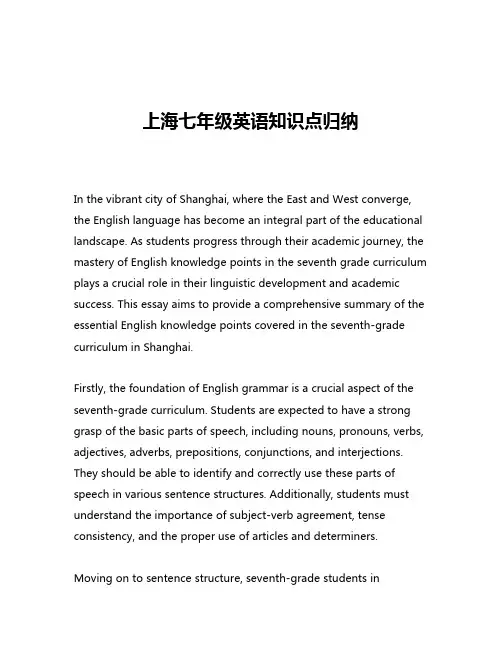
上海七年级英语知识点归纳In the vibrant city of Shanghai, where the East and West converge, the English language has become an integral part of the educational landscape. As students progress through their academic journey, the mastery of English knowledge points in the seventh grade curriculum plays a crucial role in their linguistic development and academic success. This essay aims to provide a comprehensive summary of the essential English knowledge points covered in the seventh-grade curriculum in Shanghai.Firstly, the foundation of English grammar is a crucial aspect of the seventh-grade curriculum. Students are expected to have a strong grasp of the basic parts of speech, including nouns, pronouns, verbs, adjectives, adverbs, prepositions, conjunctions, and interjections. They should be able to identify and correctly use these parts of speech in various sentence structures. Additionally, students must understand the importance of subject-verb agreement, tense consistency, and the proper use of articles and determiners.Moving on to sentence structure, seventh-grade students inShanghai are required to master the construction of simple, compound, and complex sentences. They should be able to recognize and differentiate between independent and dependent clauses, and learn how to effectively use coordinating and subordinating conjunctions to create more sophisticated sentence patterns. The ability to transform sentences from active to passive voice and vice versa is also an essential skill.Vocabulary development is another key focus in the seventh-grade English curriculum. Students are expected to expand their lexical repertoire by learning new words through various means, such as context clues, word roots, prefixes, and suffixes. They should be able to understand and apply the appropriate usage of synonyms, antonyms, homonyms, and homophones. Additionally, students are introduced to academic and subject-specific vocabulary that is crucial for comprehending and engaging with various text genres.Closely related to vocabulary is the understanding of word formation processes. Seventh-grade students in Shanghai are required to learn about the derivation of words through the addition of prefixes and suffixes, as well as the concept of word families. They should be able to recognize and apply these principles to expand their vocabulary and enhance their reading and writing skills.Comprehension of various text genres is another essentialcomponent of the seventh-grade English curriculum. Students are expected to demonstrate their ability to read and understand a range of text types, including narratives, informational texts, persuasive essays, and literary works. They should be able to identify the main idea, supporting details, and the author's purpose, as well as draw inferences and make connections between different parts of the text.In addition to reading comprehension, the seventh-grade English curriculum in Shanghai also emphasizes the development of writing skills. Students are required to produce a variety of written compositions, such as personal narratives, descriptive essays, argumentative essays, and research-based reports. They should be able to organize their ideas coherently, use appropriate transitional devices, and maintain a consistent tone and style throughout their writing.Alongside the development of writing skills, the seventh-grade English curriculum in Shanghai also focuses on the enhancement of oral communication abilities. Students are expected to participate in discussions, deliver presentations, and engage in role-play activities. They should be able to express their ideas clearly, respond appropriately to questions, and demonstrate effective listening and speaking strategies.Another crucial aspect of the seventh-grade English curriculum in Shanghai is the understanding of English language conventions. Students are required to master the proper use of punctuation, capitalization, and spelling rules. They should be able to identify and correct common grammatical errors, such as subject-verb disagreement, pronoun-antecedent disagreement, and inappropriate verb tense usage.Furthermore, the seventh-grade English curriculum in Shanghai introduces students to the study of literature, including poetry, short stories, and excerpts from novels. Students are expected to analyze the literary elements, such as theme, character, setting, and figurative language, and to interpret the deeper meanings and messages conveyed in these literary works.Finally, the seventh-grade English curriculum in Shanghai also emphasizes the development of critical thinking and research skills. Students are required to engage in research projects, where they learn to gather information from various sources, evaluate the credibility of those sources, and synthesize the information to support their own arguments or conclusions.In conclusion, the seventh-grade English curriculum in Shanghai is a comprehensive and rigorous program that aims to equip students with a solid foundation in the English language. From masteringgrammar and sentence structure to developing writing, reading, and oral communication skills, the curriculum covers a wide range of knowledge points that are essential for students' academic and personal growth. By successfully navigating these knowledge points, seventh-grade students in Shanghai can pave the way for their continued success in their English language studies and beyond.。
七年级英语上册(上海教育出版社版本)Unit 1 Making friends词组listen to music 听音乐play basketball 打篮球read books 读书be from=come from 来自…live in 住在…live with 跟…一起住close to 接近go to school 上学be good at +v-ing 擅长make friends with 交朋友all over the world 全世界be far away from 离…很远want to 想要would like to 愿意draw pictures=paint pictures 画画pay attention to 注意start with 以…开始take a bath 洗澡on the Internet 上网lots of 很多in free times 在空闲的时间best wishes 最美好的祝福句型What does...mean—It means... …是什么意思?——它的意思是…How do you go to school ——I go to school by bus/car /on foot.你怎么去上学的?——我坐公交车/汽车/步行上学My dream is to be a/an+职业=I want to be a/an+职业我的梦想是成为…What’s your favourite subject=What subjects do you like best 你最喜欢哪一科?What does your father/mother do=What is your father/mother 你爸妈做什么工作?Unit 2 Daily life词组junior high school 初级中学on foot 步行take part in=join in 参加have a good time=enjoy oneself 过得愉快go to bed/sleep 睡觉talk about 谈论brush teeth 刷牙watch TV 看电视ride a bicycle/bike 骑单车play the piano 弹钢琴wash clothes 洗衣服in the morning 在早上have break 休息from...to...从…到…at night=in the evening 在晚上at school 在学校get up 起床senior high school 高级中学have breakfast/lunch/supper/dinner 吃早/午/晚/正餐keep a dairy 写日记think of 考虑do morning exercises 做早操句型How+形容词+主语+be动词!多么…!例:How short it is!When the bell rings, ... 铃声响起的时候……Is your school close to your home ——Yes,it is./No,it isn’t.When dose the school day usually begin/start/end ——At+时间Unit 3 The Earth词组be covered by 被…覆盖provide...with...为…提供…put...into... 把…倒入…throw away 扔掉on Earth 在地球上a lot of 很多... stop doing 停止正在做的事情stop to do 停止(手上做的接着去)做某事save water 节约用水in the future 将来in the air 在空中lift up 升高句型There is+单数可数名词/不可数名词有……There are+可数名词复数有……It is + adj + (for sb) to do sth (对某人来说)做某事很…Unit 4 Seasons词组take a trip 去旅行make snowmen/a snowman 堆雪人go on /have a picnic 野餐fly kites 放风筝go swimming 去游泳in + 季节/月份(spring/summer/March/July)at the time of 在…的这个时候send out 发出have a lot of fun 玩得很开心get + adj.(warm/hot/cold) 逐渐变…start to = begin to 开始…句型It is interesting/exciting to do sth. 做某事很有趣/兴奋It spends some time dong/to do sth. 做某事花费某时间—What’s the weather like in + 某地+ today 某地今天天气如何?—It’s hot, but it will be rainy a few days later. 很热,不过过几天会下雨。
上海牛津版英语七年级上知识点在上海牛津版英语七年级上学期,学生需要学习许多英语知识点。
接下来,我们将对这些知识点进行详细的介绍。
1.基本单词在英语学习中,基本单词是必须要掌握的。
在七年级上学期,学生需要掌握一些基本的单词,包括家庭成员、数字、颜色、动物等。
2.动词的时态动词时态是英语学习中的重点之一,七年级上学期教授了一些基本的时态,包括一般现在时、一般过去时和一般将来时。
在学习这些时态的过程中,学生需要掌握动词的变化规律,以便正确地使用这些时态。
3.名词的单复数名词的单复数也是英语学习中必须要掌握的内容之一。
在七年级上学期,学生需要学习名词单数变复数的规则,并能正确地运用这些规则。
4.形容词与副词形容词和副词是描述词语,但是它们的用法不同。
在七年级上学期,学生需要学会正确地区分形容词和副词,并且学会正确地运用它们。
5.日常交际用语在英语学习中,交际用语非常重要,因为它们是日常交流中非常常用的词语。
在七年级上学期,学生需要学习一些常用的交际用语,例如问候、感谢、道别等等。
6.课堂表达在英语学习中,课堂表达具有非常重要的作用。
在七年级上学期,学生需要学会正确地表达自己的意思,包括用英语提问、回答问题,以及进行简单的口语交流。
7.听、说、读、写听、说、读、写是英语学习的四个方面,它们是相互关联的。
在七年级上学期,学生需要通过不同的练习,提高自己的听、说、读、写能力,并且能够巧妙地将这四个方面结合起来。
以上就是我们对于上海牛津版英语七年级上学期的知识点的详细介绍。
希望学生们在学习中能够认真对待这些知识点,使自己能够更好地掌握英语。
牛津上海版英语七年级上册知识点概述---在牛津上海版英语七年级上册中,我们学习了许多有趣且实用的知识点,这些知识点涉及了英语语法、词汇、阅读和写作等方面。
通过对这些知识点的学习,我们可以更好地掌握英语,提高我们的语言能力和沟通能力。
下面,我将从不同的角度来深入探讨这些知识点,希望能够帮助你更好地理解和掌握这些知识。
一、语法知识点在牛津上海版英语七年级上册中,我们学习了许多基础和重要的语法知识点,比如动词的时态、名词的单复数、形容词和副词的比较级和最高级等。
这些知识点对于我们正确理解和使用英语至关重要。
1. 动词的时态动词的时态是英语语法中一个非常基础也非常重要的知识点。
在学习动词的时态时,我们不仅需要了解各种时态的构成和用法,还需要多做练习,才能够熟练掌握。
2. 名词的单复数名词的单复数形式是我们学习英语时需要重点掌握的内容之一。
在中文和英文中,名词的单复数形式有很多规律和不规则变化,我们需要通过大量的练习来熟练掌握这些规则和不规则变化的情况。
3. 形容词和副词的比较级和最高级形容词和副词的比较级和最高级是我们在表达事物的特征和程度时经常会用到的语法知识点。
通过学习这些知识点,我们可以更准确地描述事物的特征和程度。
二、词汇知识点在牛津上海版英语七年级上册中,我们学习了许多常用且实用的词汇知识点,这些词汇囊括了各个方面的日常生活和学习,能够帮助我们更好地理解和运用英语。
1. 日常生活词汇在学习英语的过程中,我们需要掌握一些日常生活中常用的词汇,比如家庭、食物、交通工具、颜色、数字等。
通过学习这些词汇,我们可以更好地与他人交流,也更便利地适应各种日常场景。
2. 学习用语在学习英语的过程中,我们还需要掌握一些学习用语,比如学校、课程、学科、考试、活动等。
这些词汇在我们参与学校教育和学习活动时非常有用,能够帮助我们更好地理解和参与课堂学习和校园生活。
三、阅读和写作知识点在牛津上海版英语七年级上册中,我们还学习了一些阅读和写作的知识点,这些知识点能够帮助我们提高阅读理解能力和写作表达能力,从而更好地应对各种英语应用场景。
初中英语七年级上知识点初中英语七年级上册的知识点主要包括以下几个方面:1. 基础语法:- 名词:学习名词的单复数形式,专有名词和普通名词的区别。
- 动词:了解动词的基本形式,如原形、过去式和过去分词。
- 形容词和副词:区分形容词和副词的用法,学习比较级和最高级。
- 代词:掌握人称代词、物主代词、反身代词等的用法。
- 介词:学习常用介词及其搭配,如in, on, at等。
2. 词汇积累:- 学习与日常生活、学校生活、家庭、朋友等相关的基本词汇。
- 通过词汇卡片、记忆游戏等方式加强记忆。
3. 句型结构:- 学习简单句的基本结构,如主语+谓语+宾语。
- 掌握一般现在时、一般过去时和一般将来时的句型。
4. 日常会话:- 学习基本的问候语、自我介绍、询问和回答个人信息等。
- 练习在不同场合下的简单对话。
5. 阅读理解:- 阅读简短的文章或故事,理解主旨大意。
- 学习如何从文中找出具体信息,回答相关问题。
6. 写作技巧:- 学习如何写简短的自我介绍、日记或书信。
- 练习使用正确的语法和拼写。
7. 听力理解:- 通过听英语歌曲、故事或对话来提高听力理解能力。
- 练习听后回答问题或完成填空。
8. 文化知识:- 了解英语国家的基本文化习俗和社会生活。
- 学习一些简单的英语习语和俚语。
9. 学习策略:- 学习有效的英语学习方法,如通过上下文猜测词义、使用英语思维等。
10. 课堂活动:- 参与角色扮演、小组讨论等互动式学习活动,提高英语实际运用能力。
这些知识点构成了初中英语七年级上册的基础框架,学生应该通过不断的练习和应用来巩固和提高自己的英语水平。
沪教版七年级英语上册各单元知识点As we delve into the world of English learning in the first semester of Grade 7 using the Shanghai Education Edition textbook, it becomes evident that the journey is not just about acquiring vocabulary and grammar rules, but also about understanding different cultures and developing communication skills. Each unit in the textbook is designed to introduce new concepts and ideas, while also building upon the knowledge gained in previous units.**Unit 1: Greetings and Introductions**In this unit, students are introduced to basic greetings and introductions in English. They learn how to greet people in different situations, such as "Hello" for informal greetings and "Good morning/afternoon/evening" for formal occasions. Additionally, they learn to introduce themselves and others using statements like "My name is..." and "This is..." This unit lays the foundation for further communication and interaction in English.**Unit 2: Family and Friends**Unit 2 expands on the concept of introductions by focusing on family and friends. Students learn to describe their family members using terms like "father," "mother," "brother," and "sister." They also learn to introduce their friends and talk about their relationships using phraseslike "He/She is my friend" and "We are good friends." This unit helps students develop a basic understanding of family structures and social relationships in English.**Unit 3: School Life**In Unit 3, students delve into the world of school life in English. They learn to describe their school, classroom, and school activities using vocabulary like "classroom," "teacher," "student," and "lesson." They also learn to talk about their favorite subjects and activities using phrases like "My favorite subject is..." and "I like playing..." This unit helps students integrate their English learning with their daily school life.**Unit 4: Hobbies and Activities**Unit 4 focuses on hobbies and activities, allowing students to explore their interests and passions in English. They learn to talk about their hobbies using vocabularylike "reading," "swimming," and "drawing." They also learn to describe their activities using phrases like "I often..." and "My hobby is..." This unit encourages students to express their individuality and share their interests with others in English.**Unit 5: Food and Drink**In Unit 5, students delve into the delicious world of food and drink in English. They learn to identify and talk about different types of food and drink using vocabulary like "apple," "banana," "milk," and "juice." They also learn to talk about their favorite foods and drinks using phrases like "I like eating..." and "My favorite drink is..." This unit helps students develop their vocabulary and language skills while also introducing them to different cuisines and cultures.**Unit 6: Holidays and Festivals**Unit 6 brings the excitement of holidays and festivals into the English classroom. Students learn to talk about different holidays and festivals in English, such as Christmas, Halloween, and the Spring Festival. They learn to describe the traditions and activities associated withthese holidays using vocabulary like "celebrate," "decorate," and "tradition." This unit helps students understand the cultural significance of holidays and festivals while also improving their language skills.As we progress through the units in the Shanghai Education Edition textbook for Grade 7 English, it becomes evident that each unit builds upon the previous one, gradually introducing more complex concepts and vocabulary. The focus on real-life situations and cultural understanding makes the learning process more engaging and meaningful for students. By the end of the semester, students will have acquired a solid foundation in English language skills, ready to embark on more advanced learning journeys in the future.。
学习-----好资料 更多精品文档 上海市新世纪英语七年级(上)知识点大全 Unit One Housing Estates and Surroundings Lesson One Choosing a Flat in the centre of town 在市中心 in the suburbs 在郊区 face south 面南,朝南 agree with sb. 同意某人的意见 the Wangs 王家,姓王的一家人(the Fangs) need to do sth. 需要做某事 don’t need / have to do = needn’t do 不需要做… have a look (at) 看一看…. this week/year/Monday(带this,that或next的时间状语前一般不用介词) housing estate 住宅区 be happy/glad to do sth. 高兴做某事 a bigger one/pair 一个/双/条更大的 have an area of 占地…… a piece of paper 一张纸 a lot of / lots of + 可数名词复数/不可数名词 学习-----好资料 更多精品文档 Lesson Two New Housing Estates in front of 在……前面(范围之外)
in the front of 在……前面(范围之内) ten minutes’ walk 十分钟的步行路程 by the way 顺便问一下 go to…by bike = ride a bike to… 骑车去…… go to…by bus = take a bus to… 坐公车去…… go to…by air = fly to… 乘飞机去…… return to… = go/come back to… 返回…… 学习-----好资料 更多精品文档 = give …back to 归还……
给 There used to be… 过去有 There is going to be…/There will be… 将会有
lose one’s way = get lost 迷路 used to do sth. 过去常常做某事 did’t use to do sth. / usedn’t to do sth. (否定句形式) Did…use to do sth. (一般疑问句形式) be used to doing sth. 习惯于做某事(to是介词) be used to do sth. = be used to do sth. 被用来做某事 What’s…like? = How is…? ……怎学习-----好资料 更多精品文档 么样?
语法:(Lesson Three) 一般将来时构成 shall + 动词原形(只用于第一人称) will + 动词原形 be going to + 动词原
Lesson Three Making Our Home Greener On Tree Planting Day 植树节 look after…well = take good care of… 照顾好……
set out 出发,启程 do a project (on sth.) 做(某方面的)课题 enough + 名词 (to do) 学习-----好资料 更多精品文档 形容词/副词 + enough (to do)
What’s happening? 发生什么事?/怎么啦? What happened to…? ……发生什么事? make sb./sth. + 形容词 使……变得 make sb. do sth. 使某人做某事 be made to do sth. 被迫做某事 join, take part in, join in, attend 的用法比较 join 参加,加入(军队、组织、党派、团体、俱乐部等) 和某人一道做某事join sb. in (doing) sth. 学习-----好资料 更多精品文档 例如:Would you like to join us?
join in 参加(参加小规模的活动如游戏、比赛等,常用在口语中) take part in 参加(会议或群众性的活动等,强调主语在其中发挥的作用) attend 正式用语,指参加会议、婚礼、典礼、葬礼、上课、听报告等,自己去听去看,不一定起积极作用 be a member of… 成为……的一员(延续性) cut down 砍倒 at will 任意地 stop sb. to do sth. 停下来做某事 学习-----好资料 更多精品文档 stop sb. doing sth. 停止做某事
stop sb. (from) doing sth. 阻止某人做某事 =keep/ prevent sb. from doing sth.
Unit Two Holidays and Festivals Lesson One National Holidays on the morning/afternoon/evening
of…… 在……的上午 in the morning/afternoon/evening 在上午
(在有具体日期或其他修饰语时,morning,afternoon和evening等前用介词on,无修饰语时用in) What/Who/Where else… (else常和疑问词和不定代词连用) 学习-----好资料 更多精品文档 something/anything/nothing/someone else
go sightseeing 去观光
call on 拜访;号召;要(学生)回答问题 call sb. on + 电话号码 打……联系某人 get together 召集;团聚 ever since then 从那时起 invite(动词)---invitation(名词) invite sb. to do sth. 邀请某人做某事 Teachers’ Day 教师节 Children’s Day 儿童节 Women’s Day 妇女节 have a good time = enjoy oneself = have fun 玩得愉快 学习-----好资料 更多精品文档 plan to do sth. 计划做某事
sometimes 有时 some times 几次 sometime 某时 some time 一些时间,一段时间
Lesson Two Festivals in China set off 使爆炸;放(爆竹、鞭炮等);出发;动身;开始(做某事) chat with 和……聊天 need 的用法:可用作名词,及物动词和情态动词 1. need to do sth. 例如:Do you need any help? He doesn’t need to do the cooking. 2. 情态动词主要用于否定句和疑问句中,后面接省略to的动词不定式 例如:You needn’t worry about that. He needn’t go now. 学习-----好资料 更多精品文档 A:Need I finish the work today? B:Yes , you must. / No, you needn’t. 3. needn’t do sth. = don’t need to do sth. = don’t have to do sth. 不需要做某事 A:Must I finish the work today? B:Yes, you must. / No, you needn’t. What a shame! = What a pity! 真可惜! like…best 最喜欢…… = favourite start with 以……开始 end with 以……结束 lucky money 压岁钱;红包 luck---lucky---luckily ---unlucky---unluckily the dead 已故的人 (the + 形容词 ,表示某一类人) be interested in doing 对……感兴趣 What’s the date today? 今天几号? What day is it today? 今天是星期几? play games 做游戏
Lesson Three Christmas try on 试穿(代词放在中间) 学习-----好资料 更多精品文档 try to do sth. 努力做某事
try doing sth. 试着做某事 try /do one’s best to do sth. 尽力做某事 changing room = fitting room 试衣室 (at)20 per cent off 打八折 give sb. a discount 给某人打折 size large / large size 大号 in a size small / small size 小号 size medium 中号 size 15 15号 what size … at the end of… 在……尽头/结尾 in the end 最后 = at last = finally bring sb. sth. = bring sth. to sb. 把某